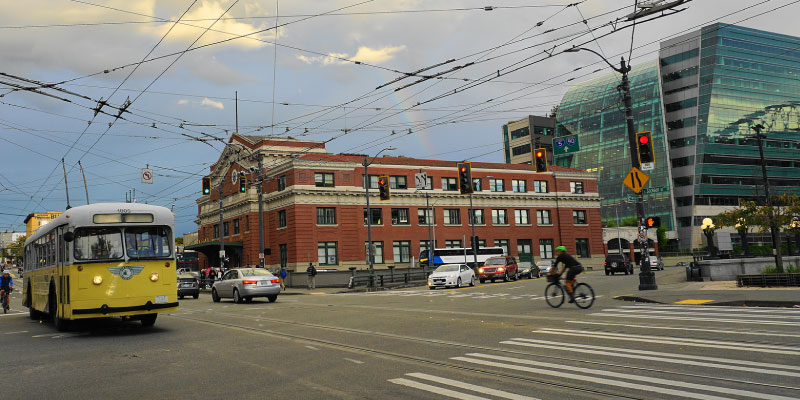For our second Roadmap to Recovery event, we were joined by Alex Hudson, executive director of Transportation Choices Coalition (TCC). Founded in 1993, TCC is a policy and advocacy nonprofit dedicated to making transportation accessible to all in Washington State. Focused on structural reform, TCC works upstream to influence legislation and policies that affect funding for departments of transportation and transit agencies.

Alex grounded the audience in the current landscape of transit ridership during the Stay Home, Stay Healthy order — though she noted there are 31 transit agencies in Washington, she focused on King County Metro and Sound Transit. Alex explained that King County Metro is still delivering 100,000 trips everyday. There has certainly been a significant decrease in commuter routes, however people who relied on transit before the pandemic continue to rely on transit. Essential workers from low-income neighborhoods, senior citizens, people with disabilities and communities of color disproportionately rely on transit, and that persists in our current crisis.
Next Alex shared the measures transit agencies are taking to protect workers and riders from COVID-19: elimination of fare collection, additional cleaning/sanitizing, boarding through the rear door, passenger load limits, and limited seating to ensure social distancing. As agencies gear up for further reopening, it’s critical they continue to listen to public health officials and enact guidance provided by experts. We’re beginning to see a couple of “new normal” practices taking hold with the requirement of face coverings and reinstitution of fare collection. Planning for the longer term is still tricky. Agencies will have to balance an unknown — new levels of demand — with a known bleak financial situation.
Transit agencies are primarily funded through local dollars — typically about twenty percent of revenue comes from fares, the other eighty percent from sales tax. As we head into a recession (when the need for transit tends to increase) agencies will have to balance the need to deliver socially distant service with significantly reduced revenue. In Seattle, the Transit Benefit District (STBD) is a special tax measure that increases Metro service and funds transit programs through a 0.1% sales tax and $80 car tabs. It’s set to expire at the end of this year. It remains to be seen if City Council will move ahead with putting an STBD renewal on the ballot this fall or if they’ll wait until the spring. Alex suggested keeping an eye on City Council through June and July — a fall ballot measure would have to be submitted to the City Clerk by August 5.

Switching gears, we asked Alex about Seattle’s Stay Healthy Streets program. Initially started as a way to provide additional options for cyclists and walkers to social distance, nearly 20 miles of Seattle streets will permanently close to most vehicle traffic by the end of May. We wanted to know, is this a sign of coming radical shifts to our transportation system? Alex was hopeful that a program like this could help people acclimate to the idea of mobility oriented to the neighborhood scale — assuming your neighborhood has amenities that meet your needs.
The first couple of questions from the audience centered around feeling safe on public transit. Alex recommended reflecting on what you personally need to feel safe riding transit and advocating for those practices. Furthermore, if your employer currently provides any transportation subsidies, be sure to communicate that you value those benefits and the measures you want to feel safe. Feedback from large employers in the area are typically well received by transit agencies, and employer subsidies are an important source of revenue.
Another audience member wondered if transit will be redirected to serve essential workers as agencies grapple with budget shortfalls. Alex explained that TCC is currently convening stakeholders for service realignment and prioritization conversations. They will develop a framework to help make decisions about how to meet the needs of people for whom transit is not a choice. An opportunity for the tech sector is micro-mobility services, such as bike- or scooter-shares, that help people connecto to transit. As difficult decisions potentially make transit less accessible, micro-mobility services can fill in critical gaps.
Stay informed:
- Get Involved with Transportation Choices Coalition
- Stay informed about local transportation infrastructure with The Seattle Times’ Traffic Lab and Crosscut.
Watch the Lunch & Learn:
